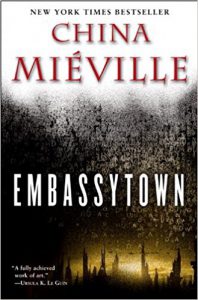Embassytown, by China Miéville
Embassytown
By China Miéville
Del Rey/Ballantine Books
Five Stars
Reviewed by Jessica Gribble
This amazing book is proof that China Miéville is one of the most talented and nimble authors writing today. Not just a science fiction novel, Embassytown is an exploration of language as a device that enables both thought and communication. But don’t worry; it’s also an engaging narrative that includes dramatic relationships, war scenes, bureaucratic entanglements, spying, backstabbing, and the occasional love scene.
Without giving too much away, the story goes like this. The Ariekei, who are native to the planet, speak Language. Humans can understand Language, but they can’t speak it. So they learn to breed human Ambassadors who can, and those doppels—two identical humans speaking with one mind—intermediate between the colonists and the Ariekei, who the humans politely call “Hosts.” Embassytown is where these trade negotiations and conversations take place.
The Ariekei as a species have been changed by their interactions with humans, and in fact, they use humans to help Language evolve. This is where Avice, the protagonist, comes in. As a child, she was asked to become a metaphor. The Ariekei then used her metaphor, “There was a human girl who in pain ate what was given her in an old room built for eating in which eating had not happened for a time,” to help talk about things they had never experienced. Avice grows up to become a space traveler, and she meets and marries an exoterre named Scile. He’s a linguist, so she brings him “home” to learn about the Ariekei. Once there, Avice gets involved with some of the Ambassadors, and by extension, the Hosts. A new Ambassador has just been sent from Bremen, the home planet. The embassy holds a big party to welcome them, but when they begin to speak, something unusual happens to the Hosts who are nearby.
As Avice becomes more involved, she meets other metaphors, who have a political agenda. She also meets some unusual Ariekei, who have been trying (albeit stumblingly) to transgress Ariekene biology and thought processes to experience the world in a different way. But their progress is stalled when the new Ambassador arrives and begins to affect the Ariekei. By the end of the book, a war between Ariekei and humans looks like it will end humanity on the planet. There are two choices: die, or survive until the host planet sends a ship. But Avice has learned more about the Ariekei than anyone else, and she’s able to tap into underground communication networks to understand not only what’s happening, but what the solution might be.
The narrative is fascinating and fast-paced, and there are lots of cool science fiction ideas and beings: “We went to galleries and exhibitions of trid. Scile was fascinated by the tramp automa of Embassytown, melancholy-seeming mendicant machines.” And they’re written perfectly, in language that does justice to a book about language: “My early days back in Embassytown, with savings and an outsider, immerser chic, I swaggered. I swaggered. I was welcomed back in delight by those who’d known me, who had never thought to see me again, who’d doubted the news of my return in the preceding miab.” Miéville even occasionally switches to second person, so all of a sudden, the reader is no longer inside the story, but a self-conscious reader again. “I told him. Revelation was spoiled for him, but I can retain it here, for you.” On that note, I won’t spoil the revelation any further. Embassytown is immensely worth reading—among the best books I’ve read—even if you’ve never read science fiction or thought much about how language helps organize thought.
